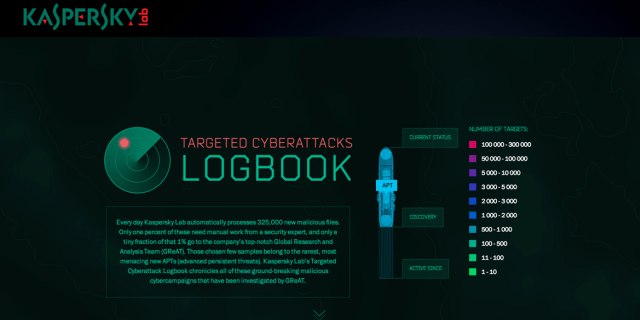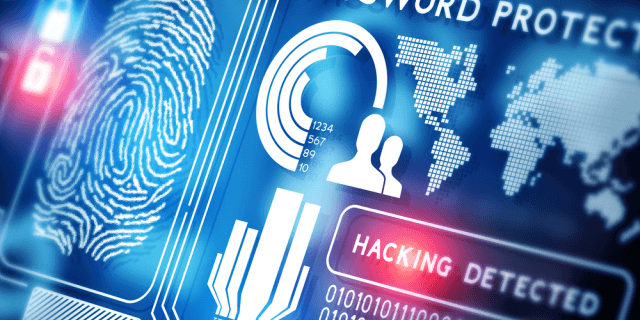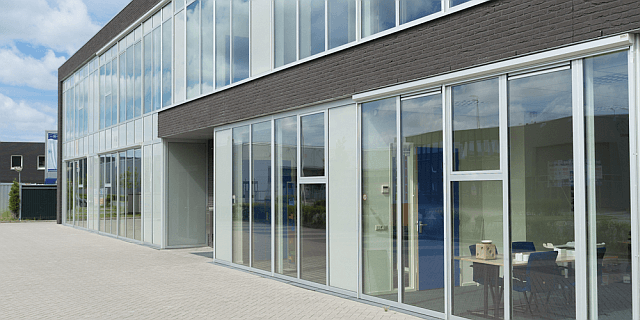
Partly Cloudy October: a spiritual successor to RedOctober APT revealed
The RedOctober operation was hastily wrapped-up just after a Kaspersky Lab’s publication in January 2013, but it was expected to return. And it did.

Musician and technology enthusiast.
356 articles

The RedOctober operation was hastily wrapped-up just after a Kaspersky Lab’s publication in January 2013, but it was expected to return. And it did.

Yesterday, Kaspersky Lab hosted the ‘Emerging Threats in the APT World: Predictions for 2015’ webinar. Special thank you to everyone who joined our discussion on how APTs will evolve in the coming year.

Kaspersky Lab experts shared their predictions on the evolution of APT. While these predictions may not come true, they are based on facts and trends already observed.

Sony Pictures Entertainment fell victim to a massive hack. Attackers used destructive malware to bring SPE networks down, while stealing up to 11 TB of data, which included both trade secrets, yellow press fodder, passwords to social networks accounts, and a lot of private information.

Ransomware is a common and much-feared problem. Here are ten facts to help in dealing with it.

Kaspersky Lab has gathered stats on the cyberthreats in 2014. The figures are appalling, but they don’t spell out doom and gloom. It is all about awareness.

Electronic devices becoming so smart that they take over mankind is a recurring theme in sci-fi. Chronophobia and futurophobia are widespread, too. But what’s the point of being afraid? Security in the coming age of Smarternet requires awareness and attention.

Cybercrime is a rather lucrative business. Cybercriminals are earning a lot, or at least their effort-to-profit rate is good enough for them to keep going. But how good is it?

Online games these days are products of years of development with budgets approaching those in Hollywood, and with similar marketing support. And if we speak of massively multiuser online games


Today’s information technologies are a rather mishmashed system comprised of top-notch innovations interspersed with legacy technologies, some of which have been in use for decades and rarely changed. This “coexistence” of new and old led to the discovery of dramatic bugs that had stayed below the radar for years.

Kaspersky Lab released its new IT Threat Evolution Q3 2014 report, dedicated to the most important security incidents and trends in the cybersecurity sphere. It may seem like attacks are increasing more rapidly than ever, but it’s detection rates that are growing.

Medieval doors were extremely sturdy due to their two-layer construction and different wood grain directions across those layers. Multilayered defensive structures is a must in cybersecurity as well.

Microsoft has patched yet another bug in OLE, this time one that’s 19-years-old. While it is extremely surprising this bug hadn’t been discovered earlier, the crucial question here is the use of the underreviewed legacy code that developers have to drag along for decades.

Will mankind become overrun by technological and information threats while future humans’ raison d’etre would be to keep the machines going “Metropolis” or “Matrix” style? We don’t know. The future remains a product of our imagination until it comes true, while our reality is the consequence of actions.

The newly disclosed Darkhotel APT campaign will surely draw increased scrutiny to hospitality systems’ security worldwide. Hoteliers acknowledge the existence of security problems in their software systems, and many are opting to move these systems into the cloud. Is this a viable solution?

Securelist has published extensive research on BlackEnergy. Initially a DDoS crimeware, it turned into a huge collection of various tools currently used in various APT-type activities, including some “significant geopolitical operations”.

1 in 8 people don’t believe that cyberthreats are real. The threat may go away if you turn your back to it in a dream, but that won’t work in reality.

Kaspersky Lab has just announced the discovery of an alarming APT campaign codenamed “Darkhotel,” targeted mainly at business executives staying at certain hotels in Asia. Luxury hotels offer not just places to stay, but also comfort and privacy. However, their cybersecurity occasionally fails.

Today’s software packages have become so huge and complex that stacks of patches issued one after the other are increasingly common. This has consequences for system administrators.

Car hacking is a topic that resurfaces regularly. Still, a remote takeover of a car’s system is not a reality – yet. It may become a reality without the proper approach to the security of a car’s on-board systems.